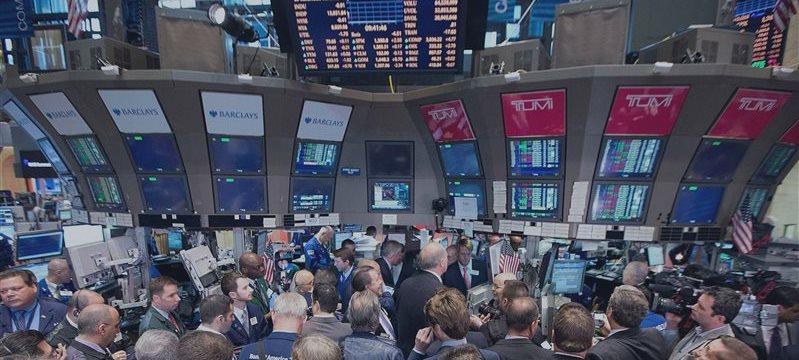Stocks from U.S. to Europe slid as increasing concern over signs of financial stress in Portugal sent investors seeking safety in Treasuries, the yen and gold.
The Standard & Poor’s 500 Index fell 0.4 percent at 1:16 p.m. in New York, paring an earlier drop of as much as 1 percent, while the Russell 2000 Index of smaller companies tumbled 0.8 percent. Volatility climbed, with the VIX (VIX) increasing 5.3 percent. The Stoxx Europe 600 Index lost 1.1 percent to the lowest level since May. Portugal’s 10-year bond yield jumped 21 basis points to 3.97 percent. Treasury 10-year rates slid two basis points to 2.54 percent, the yen advanced against all of its 16 major peers and gold climbed 1.1 percent.
Bonds of Europe’s
most-indebted nations declined as speculation resurfaced that the euro
region remains vulnerable to shocks as it emerges from the sovereign
debt crisis. U.S. equities resumed declines after a two-day selloff
earlier this week led by Internet and small-cap stocks. The value of
global equities climbed to a record $66 trillion last week, data
compiled by Bloomberg show.
“People will shoot first and ask questions later when news like this hits,” said Lawrence Creatura, a fund manager
at Federated Investors Inc. in Rochester, New York. His firm manages
about $363.8 billion. “The concern of an event like this is always
determining whether it’s occurring in isolation or whether it’s the
first domino. It’s a classic flight to safety across the equity,
commodities and bond markets.”
‘Severe’ Pullback
Speculation that U.S. stocks have risen too far, too fast fueled losses earlier in the week as Raymond James & Associates Inc. said equities are vulnerable and Citigroup Inc.’s chief U.S. equity strategist cited concerns for a “severe” pullback. The Russell 2000 is down 3.7 percent for the week, poised for its biggest loss in two years, while the S&P 500 has retreated 1 percent.
U.S. benchmark indexes ended last week at all-time highs, with the Dow (INDU) topping 17,000 for the first time, as the latest government payrolls report showed job growth blew past expectations last month and the unemployment rate fell to the lowest level since before the financial crisis peaked six years ago.
The S&P 500 has not had a drop of 10 percent in more than two years. The gauge trades at a valuation
of 18 times reported earnings, the highest since 2011 when it was in
the middle of a 19 percent slide, its biggest during the current
five-year bull market.
The Chicago Board Options Exchange Volatility Index finished last week at a seven-year low before rallying 16 percent during the first two days of the week, the biggest surge since April. The gauge known as the VIX rose 5.3 percent to 12.27 today.
Trimming Losses
U.S. equities trimmed steeper losses amid speculation the day’s initial selloff was overdone.
“I don’t think it’s something major that will set our market into any kind of tailspin,” Craig Hodges,
the Dallas-based manager of the $1.4 billion Hodges Small Cap Fund,
said by phone. The fund has beaten 99 percent of its peers over the past
three years. “We got a list of 15 to 20 names that we’d like to buy at a
cheaper price and so we kind of like days like today, where some of
weak holders get shaken out of stocks.”
Home Depot Inc. and Nike Inc. tumbled at least 1.3 percent as investors sold shares of companies whose profits are most closely linked to economic growth. Goldman Sachs Group Inc. and JPMorgan Chase & Co. slid more than 0.8 percent to lead financial firms lower. Shares in high-dividend yielding companies such as Verizon Communications Inc. advanced.
Fed Minutes
The S&P 500 rebounded 0.5 percent from a two-day selloff yesterday as optimism over corporate earnings and jobs growth outweighed Federal Reserve concern that investors may be growing complacent about risk.
Minutes of
the Fed’s June meeting, released yesterday, showed officials have agreed
they’ll end their asset-purchase program in October if the economy
holds up. At the same time, the policy makers said the central bank
should continue to support favorable financial conditions needed to
sustain growth, according to the minutes.
A report today showed fewer Americans than forecast filed applications for unemployment benefits last week, a sign the job market continues to strengthen.
Treasuries remained higher after the U.S. sale of $13 billion in 30-year bonds. The yield on the current 30-year bond fell one basis point to 3.37 percent.
Portuguese bonds retreated for a fourth day. The yield on 10-year Italian notes rose six basis points to 2.94 percent and Spain’s rate jumped seven basis points to 2.82 percent.
Portugal Debt
While
Portugal’s central bank said Banco Espirito Santo SA, the nation’s
second-largest lender, is protected after its parent missed debt
payments, Moody’s Investors Service downgraded a company in the group
citing a lack of transparency and links to other companies.
Banco Espirito Santo tumbled 17 percent before the Portuguese securities regulator said it stopped trading in the shares pending an announcement. Espirito Santo Financial Group SA, which owns 25 percent of the lender, fell 8.9 percent before the company suspended trading earlier in stocks and bonds, saying it’s “currently assessing the financial impact of its exposure” to Espirito Santo International, which has missed payments on short-term paper.
Greece’s five-year note
yield increased 12 basis points 4.33 percent. The government sold 1.5
billion euros of three-year notes via banks, priced to yield 3.5
percent. That’s higher than forecasts earlier this week for a rate of
about 3 percent from HSBC Holdings Plc and Royal Bank of Scotland Group
Plc.
‘De-Risking Mentality’
“It’s all about Portugal and the fears rippling through Europe,” Michael James, a Los Angeles-based managing director of equity trading at Wedbush Securities Inc., said in a phone interview. “Everyone’s going to be in a de-risking mentality today, which is certainly not good. It’s sell first and ask questions later, which is what you see going on.”
The
Stoxx 600 fell 1.1 percent, extending its loss for the week to 3.3
percent, which would be the largest weekly decline in more than a year.
About seven shares declined for every one that advanced in the Stoxx
600, with trading volumes 69 percent higher than the 30-day average,
according to data compiled by Bloomberg. A gauge of banks tumbled 1.7
percent to the lowest since Dec. 18.
European Stocks
Banco Popular Espanol SA (POP) dropped 2 percent. The Spanish lender said it postponed a planned issue of the riskiest bank debt because of “heightened volatility” in credit markets.
Fugro NV (FUR) sank 19 percent, the most since 2003, after the Dutch deepwater-oilfield surveyor forecast a drop in profit margin and writing off of as much as 350 million euros ($477 million). Skanska AB lost 2.5 percent after the Nordic region’s biggest construction company by global revenue said it will scale down operations in Latin America after booking 500 million kronor ($73.7 million) in project writedowns and restructuring costs.
Gold futures jumped 1.1 percent to $1,338.30 an ounce, the highest since March 21.
The yen strengthened 0.3 percent to 101.31 per dollar and gained 0.7 percent to 137.76 per euro.
Indonesian
stocks climbed to a one-year high as polls showed Jakarta’s Governor
Joko Widodo won the presidency. The Jakarta Composite Index added 1.4
percent to 5,095.20, heading for its highest close since May 2013. The
rupiah gained 0.7 percent to 11,555 per dollar, according to prices from
local banks, after touching the strongest level since May 22.
China’s Economy
The Hang Seng China Enterprises Index of mainland companies listed in Hong Kong advanced 0.3 percent, after losing 1.6 percent yesterday, its biggest decline in two weeks. The Shanghai Composite Index slipped less than 0.1 percent, extending yesterday’s 1.2 percent retreat.
China’s overseas shipments fell short of the 10.4 percent expansion that was the median of 47 economists’ estimates compiled by Bloomberg. Imports grew by 5.5 percent in June, less than the 6 percent increase projected. The trade surplus fell to $31.6 billion for June, from $35.92 in May. Data yesterday showed producer prices fell last month at the slowest pace in more than two years.
“Extreme cautiousness towards China’s economy has receded overall, with the government showing signs it will step in to support growth when needed,” said Mari Oshidari, a Hong Kong-based strategist at Okasan Securities Group Inc.



